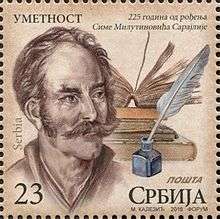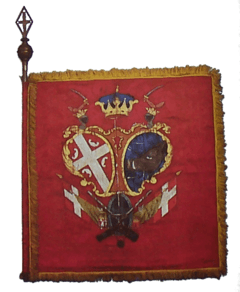Sima Milutinović Sarajlija
Simeon "Sima" Milutinović "Sarajlija" (Serbian Cyrillic: Симеон "Сима" Милутиновић "Сарајлија", pronounced [sǎːʋa milutǐːnɔʋit͡ɕ sarǎjlija]; 3 October 1791 – 30 December 1847) was a poet, hajduk, translator, historian and adventurer.[1][2] Literary critic Jovan Skerlić dubbed him the first Serbian romantist.[3]
Sima Milutinović Sarajlija | |
|---|---|
 | |
| Born | Simeon Milutinović 3 October 1791 Sarajevo, Bosnia Eyalet, Ottoman Empire |
| Died | 30 December 1847 (aged 56) Belgrade, Principality of Serbia, Ottoman Empire |
| Pen name | Simeun Milutinov, Simeun Mil. Simović, Simša M. Sirotan, Simo Milutinović, Čubro Čojkovič, Čubro Čojković-Crnogorac, Srbo Srbović, S. M. Crnogorac, Si. M. Saraj. Černogo. Herak, S. M. Simović, Č.Č.Č. Exauditus |
| Occupation | Poet, hajduk, translator, historian, philologist, diplomat. |
| Nationality | Serbian |
| Literary movement | Romantism |
Life and work
Sima Milutinović was born in Sarajevo, Ottoman Empire in 1791, hence his nickname Sarajlija (The Sarajevan). His father Milutin[4] was from the village of Rožanstvo near Užice,[5] which he left running away from the plague and eventually settled in Sarajevo, where he was married.[6]
When Sarajlija was a child, the family fled the town seeking because of a plague. They sought refuge at several locations in Bosnia and Slavonski Brod before ending up in Zemun, where Sima commenced primary education which he never completed. He attended a school in Szeged and was later expelled from gymnasium in Sremski Karlovci.[7]
During the First Serbian Uprising he was a scribe in Karađorđe's Governing Council (Praviteljstvujušći Sovjet). Sarajlija joined a guerilla group commanded by hajduk Zeka Buljubaša.[8] It was in the heat of battles with Ottoman Turks that his first poems germinated. They were mostly love songs, inspired by his first great love - Fatima.[9] After the collapse of the First Serbian Uprising he was a hajduk and teacher in Vidin. He also spent a year or two in a Turkish dungeon. After evading the Turks, he went to Chişinău (then part of Russia), where he remained, long enough to write The Serbian Maid. It is said that he sent reports to confidants of Miloš Obrenović I, Prince of Serbia concerning Karađorđe's followers in exile. In 1825 he went to Germany where he enrolled in the University of Leipzig, though he did not tarry there. Instead, a year later, he went back to Serbia to be a clerk in the employ of Prince Miloš but on arriving in Zemun, however, he turned about and went to Trieste, Kotor, and then Cetinje.
He arrived in Cetinje on 25 September 1827, and the Bishop of Montenegro took him in as a secretary.[10] He also went among the tribes to dispense justice and settle disputes and took upon himself the education of Bishop's nephew Rade (Petar I Petrović-Njegoš). In 1829 Bjelice tribe struggled against Ozrinići and Kuće, two neighboring tribes, and his former pupil Petar I Petrović-Njegoš sent Sarajlija and Mojsije to negotiate peace among them.[11] Sarajlija remained in Cetinje for more than three years, until the spring of 1831. He came to Montenegro for another three times.
In 1836, he escorted Prince Miloš to Istanbul and went on to travel to Prague, Vienna and Budapest. He remained a while in Budapest and married Marija Popović-Punktatorka[12] (1810–1875), who was also a poet.
He died suddenly in Belgrade at the end of 1847. He was buried in the graveyard at St. Mark's Church.
Selected works

- Serbijanka, epic poem
- Nekolike pjesnice, stare, nove, prevedene i sočinjene Simom Milutinovićem Sarajlijom, book of poems
- Zorica, book of poems
- Tragedija Obilić, epic poem about Miloš Obilić
- Raspjevke Talfiji, book of poems
- Dika crnogorska, drama
- Istorija Crne Gore: History of Montenegro
- Pjevanija crnogorska i hercegovačka, collection of Serbian epic poetry from Montenegro and Herzegovina
- Tragedija vožda Karađorđa, epic poem about Leader Karađorđe
- Collected works published in 6 volumes[13]
See also
References
- "Есеј "Сима Милутиновић Сарајлија - Поета и устаник" · Бројчана (Дигитална) Баштина Новог Сада". bbns.rs. Retrieved 2019-12-11.
- "Milutinović Sarajlija, Sima", Croatian Encyclopedia (in Croatian), Leksikografski zavod Miroslav Krleža, 1999–2009, retrieved April 24, 2014
- "НЕБОМ ОСИЈАНИ ПЕСНИК СРПСКЕ НАРОДНОСТИ: Сима Милутиновић Сарајлијa- 171 година од смрти". ИСКРА. Retrieved 2019-12-11.
- PATriot (2017-12-30). "Na današnji dan 1847. umro SIMA MILUTINOVIĆ SARAJLIJA, srpski pesnik". Patriot (in Serbian). Retrieved 2019-12-11.
- "О Његошу и његовом учитељу Симу Милутиновићу Сарајлији | Српска Православнa Црквa [Званични сајт]". www.spc.rs. Retrieved 2019-12-11.
- "НЕБОМ ОСИЈАНИ ПЕСНИК СРПСКЕ НАРОДНОСТИ: Сима Милутиновић Сарајлијa- 171 година од смрти". ИСКРА. Retrieved 2019-12-11.
- "Есеј "Сима Милутиновић Сарајлија - Поета и устаник" · Бројчана (Дигитална) Баштина Новог Сада". bbns.rs. Retrieved 2019-12-11.
- "О Његошу и његовом учитељу Симу Милутиновићу Сарајлији | Српска Православнa Црквa [Званични сајт]". www.spc.rs. Retrieved 2019-12-11.
- PATriot (2017-12-30). "Na današnji dan 1847. umro SIMA MILUTINOVIĆ SARAJLIJA, srpski pesnik". Patriot (in Serbian). Retrieved 2019-12-11.
- "О Његошу и његовом учитељу Симу Милутиновићу Сарајлији | Српска Православнa Црквa [Званични сајт]". www.spc.rs. Retrieved 2019-12-11.
- Miloš Oben; Michel Aubin (1989). Njegoš i istorija u pesnikovom delu. Književne novine. p. 63. Retrieved 7 May 2013.
Бјелице су племе у Катунској нахији. Водили су 1829. оружану бор- бу са два суседна племена, Озринићима и Цуцама. Да би успоставио мир, Петар I је решио да им пошаље Симу Милутиновића и Мојсија
- "Есеј "Сима Милутиновић Сарајлија - Поета и устаник" · Бројчана (Дигитална) Баштина Новог Сада". bbns.rs. Retrieved 2019-12-11.
- "Есеј "Сима Милутиновић Сарајлија - Поета и устаник" · Бројчана (Дигитална) Баштина Новог Сада". bbns.rs. Retrieved 2019-12-11.
Further reading
| Wikimedia Commons has media related to Sima Milutinović Sarajlija. |
- Milovan Djilas: "Njegoš - poet, prince, bishop," Harcourt Brace (1966)
- Jovan Pejčić: Zasnovi Gligorija Vozarovića, 158 str, izd. Dental, Beograd 1995, ISBN 86-82491-08-7 v. fusnotu 166. na str. 118-120.
- Tanja Popović, Poslednje Sarajlijino delo - o Tragediji Vožda Karađorđa, Beograd, 1992.
- Jovan Skerlić, Istorija nove srpske književnosti (Belgrade, 1921), pages 156-163
- Adapted from Serbian Wikipedia: Сима Милутиновић Сарајлија

